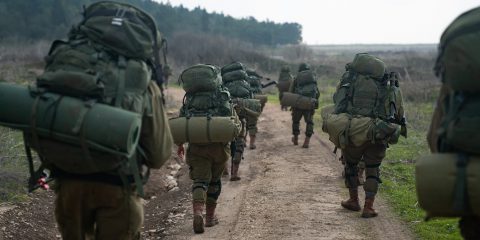Israel’s government must nurture a spirit of unity and national purpose by building a policy consensus as broad as possible. This is necessary both in preparation for likely combat operations against Iran and its proxies, and in order to respond wisely to the American peace plan and to intelligently manage conflict with the Palestinians.
Israel is a strong country and its strategic position is better than ever. Nevertheless, Israel still faces significant security challenges.
Primary among the growing challenges are a hegemonic Iran, alongside attendant threats to Israel’s civilian home front from the Iranian regime and its proxies. In addition, for the foreseeable future, Israel faces a violent and intractable conflict with the Palestinians. Therefore, Israel must always be ready for war. This is the ultimate test for Israeli society, too.
The most important challenge facing any government in Israel is nurturing cohesion in Israeli society; ensuring unity in the face of difficulty that may be thrust upon Israel by the violent Mideast environment. Such cohesion is important even at times of calm, due to its role in deterring Israel’s enemies.
Deterrence is based not only on sheer military might, but on the country’s willingness to use force when necessary; and above all, on the capacity to bear loss both at the frontlines and on the home front.
Since peace for Israel is not yet around the corner, Israel’s ability to present effective responses at times of crisis is crucially influenced by the level of cohesiveness among varied components of Israeli society. Deep social or political cleavages, or a disconnect between political and military echelons (or, between both of them and public sentiments) – undermine the effective implementation of national policy. Such divisions only encourage the enemy to attack, undercut the authority of elected officials, and weaken resolve of the home front when under fire.
The recent history of Israel stands as a warning against military and diplomatic wild adventures which were, perhaps, successful in the short-term but soon led to deep social fissures; to deep scars which have yet to heal.
Cases in point: The launch of the First Lebanon War in 1982, which at first was broadly backed by the public but soon dramatically lost almost all support; the Oslo Accords, which from the start were extraordinarily divisive and became ever more bitterly contested following the assassination of Prime Minister Yitzhak Rabin; and the disengagement from Gaza and northern Samaria in 2005.
It should be emphasized that these political fissures (which some have termed a division into separate “tribes”) do not overwhelm the basic bonds of solidarity which continue to characterize Israeli society. In fact, the reemergence of centrist impulses in Israeli politics indicates the persistence of wide common denominators.
In the security realm, the broad public support for Operation Protective Edge in 2014 serves as proof that national cohesion does exist, particularly when the going gets tough and the public senses that there is no alternative to war. (More than 85% of the public backed that military campaign).
It is my view that such Israeli national cohesion must be preserved – even at the expense of adopting some constraints on the government’s freedom of action, and even curtailing some military operations in order to maintain internal (and international) legitimacy.
What can the Israeli government do to nurture cohesion? Many things. After the intemperate April election campaign and towards the September repeat vote, special responsibility devolves upon the government to restore restraint in public discourse and avoid demonization of political rivals.
Israel’s response to the Trump administration’s upcoming peace initiative also should also be designed to reflect the basic principle of preserving national cohesion. This means focusing on territorial and other key assets that obtain nearly universal support within Israeli society. Unilateral withdrawals that would deepen divisions in society should not be contemplated, especially when the expected results are highly doubtful.
Building in Judea and Samaria settlements should be restrained, maintaining the present territorial footprint – the contours of which are generally within an Israeli consensus. On the other hand, many more homes should be built in and around Jerusalem, to strengthen Israel’s hold on the broad Jerusalem envelope which lies at the heart of Israeli national consensus.
This article is translated and excepted from the institute’s national security plan for Israel, which was recently released in Hebrew. For an English summary of the plan, see here. A version of this article was published in Israel Hayom, 11.06.2019.
JISS Policy Papers are published through the generosity of the Greg Rosshandler Family.
photo: Bigstock









 - בניית אתרים
- בניית אתרים